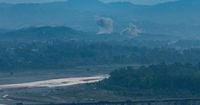The fighting between India and Pakistan intensified sharply on Saturday, May 10, 2025, with both sides targeting air bases and military sites, and each blaming the other for striking first. Pakistan reported that India targeted at least three of its air bases with air-to-surface missiles in the early hours of Saturday, including Nur Khan, a key air force installation near the capital, Islamabad. Witnesses in the city of Rawalpindi, where Nur Khan is located, reported hearing at least three loud explosions, with one describing a “large fireball” visible from miles away.
Within hours, Pakistan said it had retaliated using short-range surface-to-surface missiles against several locations in India, including the Udhampur and Pathankot air bases and a missile storage facility. “An eye for an eye,” the Pakistani military said in a statement. India, however, stated it struck several Pakistani military targets, including two radar sites, in response to a wave of Pakistani attacks on 26 locations using drones, long-range weapons, and fighter planes. Vyomika Singh, an Indian military spokeswoman, said there was “limited damage” to equipment and personnel at four air force bases.
India's foreign secretary, Vikram Misri, emphasized that India had defended and reacted in a responsible and measured fashion. The military engagement between India and Pakistan has been the heaviest since the armed confrontation began on Wednesday, May 7, 2025. This escalation followed India’s airstrikes in Pakistan, which were conducted after accusing Pakistan of harboring terrorist groups responsible for a deadly attack on tourists in India-controlled Kashmir last month.
Since then, the crisis has spiraled into the most expansive confrontation between the two nations in half a century, with fierce fighting along sections of their border and drone attacks hitting deeper within each country. Each response has generated waves of claims, counterclaims, and disinformation, prompting concern worldwide. Diplomatic efforts to defuse the crisis have been initiated by countries like Saudi Arabia, the United Arab Emirates, and Qatar, which have strong ties to both India and Pakistan.
On Friday, May 9, 2025, Secretary of State Marco Rubio spoke with Pakistan’s army chief, Gen. Asim Munir, in an attempt to ease tensions. Rubio “continued to urge both parties to find ways to de-escalate and offered U.S. assistance in starting constructive talks in order to avoid future conflicts,” according to State Department spokeswoman Tammy Bruce. Foreign ministers from the Group of Seven industrialized nations also urged “maximum restraint from both India and Pakistan” and warned that “further military escalation poses a serious threat to regional stability.”
Despite the diplomatic pressure, including visits to Islamabad and New Delhi by delegations from various countries, the situation has not improved. Pakistan’s deputy prime minister, Ishaq Dar, stated that his government had no choice but to respond. “This is measured and proportionate, and payback for what they have done,” he said on Geo News, a Pakistani television channel, adding ominously, “Where it ends all depends on India.”
As the conflict escalates, fears among the populations of both nations grow regarding the potential for a wider war. India and Pakistan, which became separate countries in 1947, have fought three wars, with disputes over Kashmir central to each conflict. The current hostilities are particularly alarming, as they represent the most significant military engagement in decades.
In a related development, Pakistan’s armed forces announced they were targeting military sites in India following India’s missile strikes on three air bases in Pakistan’s Punjab province early Saturday. An Indian official, speaking anonymously, reported that Pakistan had attacked Indian military establishments and civilian areas with missiles and fighter jets. The scope of casualties and damage from these attacks was not immediately clear.
Omar Abdullah, the chief minister of Jammu and Kashmir, reported that one government official was killed after his government home was hit by shelling from Pakistan. This marks a grim escalation in the conflict, as both sides have engaged in tit-for-tat attacks, further complicating the already dire situation.
Lt. Gen. Ahmed Sharif Chaudhry, Pakistan's chief military spokesman, confirmed that India had targeted Nur Khan air base, Murid air base in Chakwal, and Rafiqui air base near Shorkot with air-to-surface missiles. He claimed that most of the missiles were intercepted and that there were no casualties or damage, framing India’s actions as “pushing the whole region toward dangerous war.”
The media wing of Pakistan’s military quickly stated that the armed forces were targeting Indian military sites and claimed to have struck multiple locations. Residents in Srinagar reported hearing at least five blasts in the early morning, suggesting that multiple targets were hit.
As the situation developed, Secretary of State Marco Rubio reiterated the need for de-escalation in a call with Pakistani Army Chief Asim Munir. This call came shortly after Pakistan began targeting Indian positions on Saturday morning. Michael Kugelman, a South Asia analyst, noted that Pakistan’s immediate retaliation suggested it had been preparing for a military response proportional to India’s initial strike, which had resulted in over 20 fatalities.
The conflict began last month when militants killed 26 people in the tourist area of Pahalgam in Indian-administered Kashmir, marking the deadliest assault on Indian civilians in over 15 years. In response, India conducted airstrikes inside Pakistan and Pakistan-administered Kashmir on May 7, 2025, claiming to have downed five Indian warplanes.
As tensions rise, foreign diplomats from nations such as Saudi Arabia, the United Arab Emirates, and Qatar have attempted to mediate, though their efforts have yielded little success. The United States and China have also called for diplomatic solutions, but the path forward remains unclear. Vice President JD Vance emphasized in a recent interview that while the U.S. desires de-escalation, it is “fundamentally none of our business.” In contrast, White House press secretary Karoline Leavitt stated that President Donald Trump wanted to see the conflict “de-escalate as quickly as possible.”
Pakistani Prime Minister Shehbaz Sharif called a meeting of the National Command Authority on Saturday, which oversees Pakistan’s strategic assets, including its nuclear arsenal. This meeting underscores the seriousness of the situation, as both nations are nuclear-armed and the stakes are incredibly high. Asfandyar Mir, a senior fellow at the Stimson Center, remarked, “There is no real historical precedent for what we’re seeing unfold. We are now at a critical height on the escalation ladder.”




